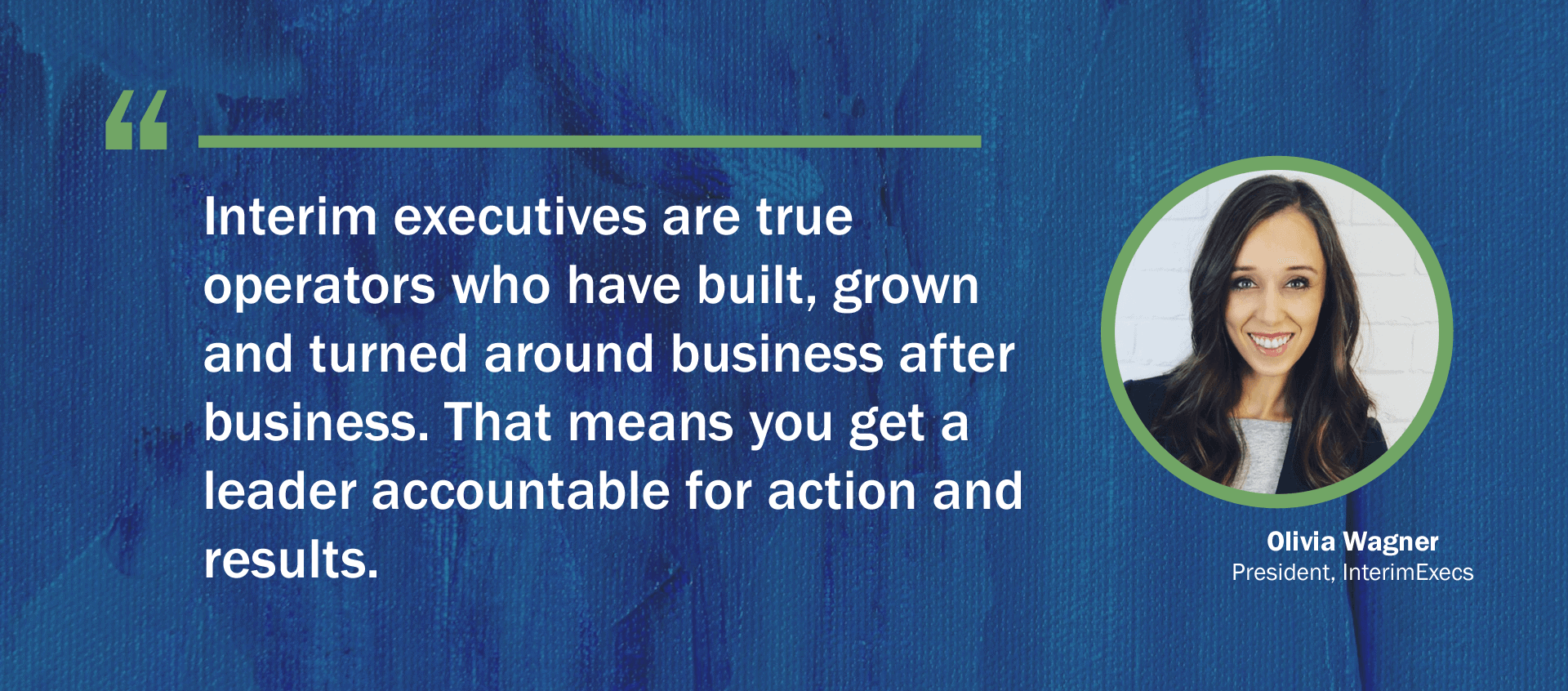What is an Interim Executive?

The Ultimate Guide to Interim Management — Chapter 1: What is an Interim Executive?
01: What is an Interim Executive?
The common definition of interim management: a highly skilled executive who takes a position for a short period of time rather than agreeing to be a new permanent hire.
But that just scratches the surface of what an interim executive is and does. Interim executives are change agents. They help companies solve complex business challenges and have a track record of achieving strong results. They can be on-site in as little as 48 hours, ready to address your company’s specific needs.
The best interim executives have a history of success in traditional C-level roles — CEO, CFO, CIO, COO, CMO, CHRO — before taking on project-based, fractional, or interim assignments.
Not to be confused with board members who sometimes temporarily step in as placeholders under the “interim” title, career interims are wired for action. Their real strength is their experience and willingness to jump into the pilot’s seat and lead the organization in whatever course correction and improvement is needed, bringing with them great energy, sound decision making, and a track record of great results.
Thanks to the advent of our gig economy, highly skilled senior executives are no longer wedded to permanent roles. The best interim executives thrive on change. They want to step into a role, fix what needs to be fixed, and move on to the next challenge.
Whether you’re in need of restructuring, have a leadership gap in your management team, or need someone with extensive experience to head up a new project, there is a rock star interim executive ready to step into the role.

The Complete Guide to Interim Management
-
- 01 What is an Interim Executive?
- 02 When is an Interim Manager the Right Choice?
- 03 When an Interim Executive is Not a Good Option
- 04 What’s the Difference Between an Interim Executive and a Consultant?
- 05 How do Interim Execs Approach Assignments?
- 06 Interim Executive Recruitment: Making the Right Match
- 07 How to Prepare Your Company for an Interim Leader

Common Expertise of Interim Leaders
Interim executives typically have a decade or more of management role experience across a diverse range of industries and executive roles, from Fortune 500 companies to private equity fund operations to nonprofit organizations.
Interim CEOs are ready to take the helm of the company to lead it through a period of transition. Interim CFOs are financial experts who can take your company to new levels of profitability, prep the company for sale or IPO, or simply ramp up your financial reporting. Interim COOs are efficient operators who can guide revamp processes or oversee a specific project.
Regardless of the title, these experienced managers are adept at:
▶ Driving results. Interims are data-driven executives who understand they are there to meet certain KPIs.
▶ Crisis management. Companies facing intense periods of change often need the outside expertise and calm leadership that are hallmarks of executive interim management.
▶ Hands-on leadership. Like management consultants, they will develop a plan, Unlike management consultants, interim executive will stay on to execute those strategic initiatives.
▶ Fundraising. Whether finding financing for a startup or cash for a turnaround, interim CFOs know where to find the money.
▶ Prepping companies for exit. Experienced interim executives have worked with business owners ready to sell and done due diligence for an Initial Public Offering. Many interim CEOs are former business owners who cashed out at high multiples.
▶ Driving M&A transactions. Interims can start with market analysis and move through due diligence, negotiation, and post-acquisition integration.
▶ Supply chain innovation. Interim executives have experience with all forms of supply chains, from nearshoring to global acquisitions.
▶ New product development. You can contract with an interim executive on a project basis to develop and launch new products.
▶ Operating efficiencies. From an interim CIO or CTO who can revamp your tech stack to a senior-level COO who can implement new processes and project management controls, there is an experienced interim who can solve your company’s operating challenges.
▶ Rallying all stakeholders. Experienced interims understand that they need everyone — from staff members to customers to board members — working together to achieve a common goal.
Common Traits of Interim Executives
There is no single skillset that defines an interim, but interim executives do share some common traits, including:
▶ They have a proven track record of success across companies and industries. That means they know what works, what doesn’t, and how to get things done.
▶ They are change management experts. They take a short period of time to gather the data needed to confirm key assumptions, understand initiatives, and develop a plan. Then they put that plan into action.
▶ They stay cool under pressure. Crisis management is what they do. They exude calm confidence in the face of real-world pressures and a constantly changing business landscape, demonstrating their extensive experience solving complex problems.
▶ They are great teachers, clear decision-makers, and strong communicators. All of that is necessary when the organization is operating at speed.
▶ Their goal is to leave the company in better shape than they found it. That may include helping to hire, onboard, and mentor their full-time replacement.
Companies looking to engage an Interim always have a lot on the line, with the company’s strength, viability, profitability, and scalability hanging in the balance. An integral part of any Interim’s value proposition is how well they can integrate into a company; assess complex and unfamiliar people, processes, and technologies; define strategies to address the situation; and execute the resulting initiatives.
Continue Reading: Chapter 2 – When is an Interim Manager the Right Choice?

FREE DOWNLOAD
Top Trends Driving the Growth of Interim Management
▶ Introduction
▶ 1: What is an Interim Executive?
▶ 2: When is an Interim Manager the Right Choice?
▶ 3. When an Interim Executive is Not a Good Option
▶ 4: What’s the Difference Between an Interim Executive and a Consultant?
